 When Sprint first demonstrated the BlackBerry Mobile Voice System (MVS) to me back in 2007 I was suitably impressed. It essentially ported your work phone onto your BlackBerry. You could make, receive, & transfer calls as if you were at your desk phone. We then mentioned it on BerryReview in late 2008 explaining how it works. Now 2 years later RIM is pitching the same song and dance (aka MVS) with only one added feature. The ability to schedule conference calls. Kind of depressing…
When Sprint first demonstrated the BlackBerry Mobile Voice System (MVS) to me back in 2007 I was suitably impressed. It essentially ported your work phone onto your BlackBerry. You could make, receive, & transfer calls as if you were at your desk phone. We then mentioned it on BerryReview in late 2008 explaining how it works. Now 2 years later RIM is pitching the same song and dance (aka MVS) with only one added feature. The ability to schedule conference calls. Kind of depressing…
As a bit of background: RIM purchased a company called Ascendent Systems back in 2006 which is where the Mobile Voice System originates. It tried to tie your BlackBerry to your corporate PBX and let you carry its features on your BlackBerry. The idea was to be able to extend corporate desk phone functionality to mobile users on their wireless handsets.
In its current form the BlackBerry Mobile Voice System connects to your PBX (Cisco from what I gather). It will then add your work line to your BlackBerry allowing you to make calls from your work number and receive calls from your work number. It also lets you dial internal extensions directly.
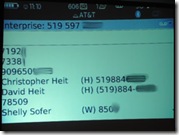
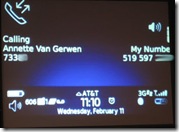
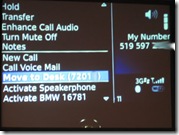
The way it does this is that your phone sends a data packet with call setup instructions to the MVS. The MVS then tells your PBX to make two outgoing calls, one to you and one to your recipient. Your recipient will see your work caller ID on their phone not your cellphone number. When you receive a call on your work phone your PBX will automatically setup an outgoing call to your cellphone. The MVS admins can setup the system with custom call routes. This means that if your company has two locations with a homogeneous system that speaks to each other the call can be routed using your internal systems saving money.
Now almost 3 years after RIM purchased MVS they have added a few small features that will be coming with the next release:
- You will be able to set the location of a meeting invite to be a conference call
- It will let you set a default conference call setting so that the number and passcode are automatically entered.
- Then it will easily allow you to connect to the conference call from the calendar menu

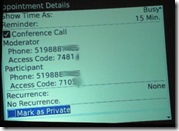
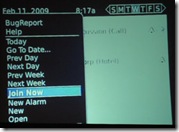
Playing devils advocate here for a bit I have yet to see anything enticing coming from MVS especially at 4K+. Its value adds are basically:
- Call a work extension directly
- Make calls with the caller ID showing your work number
- Receive calls from your work number on your cellphone
- Route calls through your PBX to try and save money on long distance
- Tie in with your calendar for conference calls (coming in upcoming versions)
- 1 voicemail box for your BlackBerry and work phone
- Setting call limits such as long distance, 900 numbers, 411, & roaming
- Different ringtone for work or personal calls
I just don’t find any of those features that appealing… The weird part is that RIM is really trying to push MVS and is one of the main goals management has set for their employees. What I find sad is that practically all of these things can be done without MVS…
- Call a work extension directly
- You can already easily dial an extension (almost) directly free using Smart Dialing
- Make calls with the caller ID showing your work number
- It is possible to perform call bridging free with Asterisk IP PBX and other solutions (though not as elegantly)
- Receive calls from your work number on your cellphone
- Call hunting is a feature found in most PBX’s that will automatically call multiple numbers
- Route calls through your PBX to try and save money on long distance
- You can also setup many modern PBX’s to act as a long distance call bridge. There is also the popular BerryDialer calling card application.
- Tie in with your calendar for conference calls (coming in upcoming versions)
- Not sure why I could not just put the call in number as the location for a meeting invite…
- 1 voicemail box for your BlackBerry and work phone
- You can easily have your BlackBerry forward voicemail to your work voicemail server
- Setting call limits such as long distance, 900 numbers, 411, & roaming
- Users could just make these same calls from their regular cellphone line…
This all makes me wonder why RIM thinks MVS is the wave of the future. At a recent press event I asked the speaker (David Heit, Director of Product Management) why RIM has avoided adding direct SIP/VOIP dialing over Wi-Fi and he just had a boiler plate response. He said that RIM is looking into it but does not think that the solution would be robust enough. In essence they claim that Wi-Fi networks are not great at handing off connections from one access point to another. I have to call foul on this one since I have seen the recent Aruba Networks enterprise wireless equipment and it hands off connections like a charm!
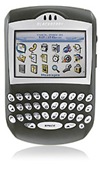 ALSO RIM released the 7270 a few years back which was the first BlackBerry with Wi-Fi. It was the only BlackBerry to only have Wi-Fi and no cellular radio. It gave users regular BlackBerry functions over Wi-Fi ALONG with Session Initiated Protocol (SIP)-based IP telephony. In other words RIM has already released a Wi-Fi SIP/VOIP only phone! I just want them to extend that same support to current generation BlackBerry’s with Wi-Fi.
ALSO RIM released the 7270 a few years back which was the first BlackBerry with Wi-Fi. It was the only BlackBerry to only have Wi-Fi and no cellular radio. It gave users regular BlackBerry functions over Wi-Fi ALONG with Session Initiated Protocol (SIP)-based IP telephony. In other words RIM has already released a Wi-Fi SIP/VOIP only phone! I just want them to extend that same support to current generation BlackBerry’s with Wi-Fi.
The 3rd party company rep that they had come in to extol MVS (Jam Enterprises) was an exception rather than the norm. They (Jam) managed to work out a deal with Rogers in Canada where they get incoming calls free on their mobile devices. This works great with MVS since every call is just two incoming calls. In the US this stuff just does not fly. I do not know many companies that have free incoming calls without paying an arm and a leg for those lines defeating the purpose of MVS.
Constructive criticism:
What I am trying to accomplish with this whole article is point out how RIM has a way to go before they gain any traction with MVS. With 3 years under their belt RIM has barely done anything with MVS. It is practically the same solution they had when they first purchased Ascendant. The only real feature that I see is that it lets you make calls from your cellphone as if you are at work. I just don’t see that being enough of a reason to get MVS. RIM is trying to pitch MVS as a desk phone replacement for mobile workers but I don’t see why they need MVS to get work calls. They could just forward a work extension to their cellphone for free without MVS.
RIM could really revive interest in MVS if they found a way to tie it into VOIP over Wi-Fi. They already offer UMA and you can see how popular that is. Even their poster child company (Jam) is using Rogers which offers UMA service over Wi-Fi which has proven to be reliable enough. The main problem I see is that RIM considers the carriers as their customers and VOIP is a threat to traditional carriers. Until that changes MVS will enjoy the same popularity is has until now. The current value adds are what CIO’s would consider “nice to have but not necessary” and during these economic times a “nice to have” is not that appealing. Maybe if they bundled MVS free with a BES license…
I will open up the floor for comments but I doubt there will be much argument on this one.
If you company does use MVS what have been your experiences?
All I can do is echo what David Heit said about MVS to our buddy Al Sacco: "Five years from now this is going to be great." Right now not so great…
